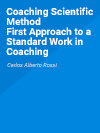-
ABARCA, Nureya, Inteligencia Emocional en le liderazgo, Santiago de Chile, Chile, 2004.
|
-
ACOSTA, José Maria, Gestión eficaz del tiempo y control del estrés, Madrid, España, 2008.
|
-
ALTILIO, Alejandro, VAN DEN. John, Buenos Aires, Argentina, 2004.
|
-
ARAGONES, Juan Ignacio, AMERIGO, Maria, PsicologÃa ambiental: tercera edición, Madrid, España, 2010.
|
-
BASS, Jossey, Action Coaching. How to Leverage Individual Perfomance for Company Success, San Francisco, USA, 1999.
|
-
BAYON, Fernando, CUBEIRO, Juan Carlos, ROMO, Marta, SAINZ, José Antonio, Coaching realmente, un enfoque europeo y empresarial, Madrid, España, 2006.
|
-
BRAIDOT, Néstor Pedro, Neuromanagement: cómo utilizar a pleno el cerebro en la conducción de las organizaciones, Buenos Aires, Argentina, 2008.
|
-
BROOKS,Robert, GOLDSTEIN, Sam The power of resilience, New York, USA, 2003.
|
-
CHERNISS, Cary, GOLEMAN, Daniel, The Emotionally Intelligent Workplace, 2001.
|
-
CONLEY, Chip, Emotional equations: Simply truths for creating happiness + success, New York, USA, 2012.
|
-
DOIDGE, Norman, The Brain that changes itself: stories of personal triumph from the frontiers of brain science, New York, USA, 2007.
|
-
DORMEHL, Luke, The Formula, New York, USA, 2014.
|
-
GOLDSMITH, Marshall, LYONS, Laurence, FREAS, Alyssa, Coaching for Leadership, California, USA, 2000.
|
|
-
HAUDAN, Jim, The art of Engagement. Bridging the Gap Between people and possibilities, D.F, Mexico, 2010.
|
-
HELLRIEGEL, Don, SLOCUM JR. John W., Organizational Behavior 12th ed, D.F, Mexico, 2009.
|
-
KOURILSKY, Francoise, Du désir au plaisir de changer. Comprendre et provoquer le changement, Dunod, ParÃs, 2004.
|
-
LEDOUX, Joseph, The emotional brain, New York, USA, 1999.
|
-
LEIBLING, Mike, PRIOR, Robin, Coaching made easy, 2004.
|
-
MARTIN, Garry, PEAR, Joseph, Modificación de conducta: qué es y cómo aplicarla, Madrid, España, 2008.
|
-
MAXWELL, John, Mentorin 101, Buenos Aires, Argentina, 2008.
|
-
O`CONNOR, Joseph, LAGES, Andrea, Coaching with NLP, 2004.
|
-
PALOMO, Maria Teresa, Liderazgo y motivación de equipos de trabajo, Madrid, USA, 2007.
|
-
PARSLOE, Eric, WRAY, Monika, Coaching and mentoring, D.F, Mexico, 2002.
|
-
REDOLAR, Diego, Neurociencia Cognitiva, Madrid, España, 2013.
|
-
REEVE, Johnmarshall, Motivación y Emoción Quinta Edición, D.F, México, 2010
|
-
SALVADOR, Carrión Lopez, Inteligencia Emocional con PNL, Madrid, España, 2000.
|
-
SINAUER ASSOCIATES, Neuroscience: Third edition, Madrid, España, 2004.
|
-
SMITH, Edward, KOSSLYN, Stephen, Procesos cognitivos: modelos y bases naturals, Madrid, España, 2008.
|
-
VALDERRAMA, Beatriz, Desarrollo de competencias de Mentoring y Coaching, Madrid, España, 2009.
|
-
WHETTEN, David, CAMERON, Kim, Desarrollo de habilidades directivas. Sexta Edición, Mexico, 2005.
|
-
WILSON, Terry, The empowerment Manual, Reino Unido, 1996.
|

